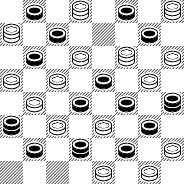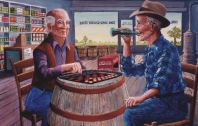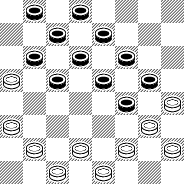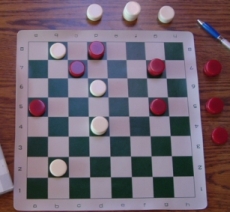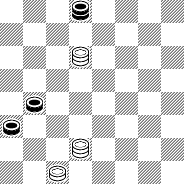The Checker Maven
The World's Most Widely Read Checkers and Draughts Publication
Bob Newell, Editor-in-Chief
Published each Saturday morning in Honolulu, Hawai`i
Contests in Progress:
Speed Department

How quickly can you solve these? A timer is running while you work! Click "Got It!" when you've figured it out and you'll see exactly how long it took.
Click Read More to check your solution.
These problems are provided courtesy of a gentleman named Charles, who in 2005 is celebrating his 60th year playing the Grand Old Game. He can be found on the GoldToken game site under the name NATONE. Look him up and play a friendly game or two.
Now: ready, get set, GO!
No. 1 (easy)
No. 2 (very easy)
[Read More]But the Computer Says......
Here's a problem attributed to O. H. Richmond, and published a little over 50 years back by Tom Wiswell. He called it "Black Beauty":
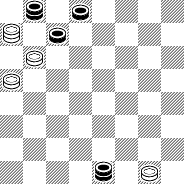
WHITE
Black to Play and Win
Now, you'll surely find that this is a neat problem and a "real twister" as Wiswell would say. So solve it, check your solution with the animation here, and then click on Read More to find out what the computer has to say about this problem. It won't be what you think--- or will it?
[Read More]Major Update to Program Reviews
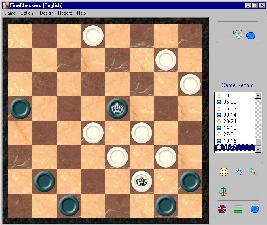
A Real Mind-Boggler
The Checker Maven presents as its most unusual offering for January the following mind-boggler attributed to a Mr. W. Veal. It is a "stroke" problem, that brand of spectacular, if unrealistic fireworks that appeals to some and is anathema to others.
To be sure, the position below is composed and obviously impossible; there just aren't that many pieces in a game, and they could never get into such a contorted distribution. But for the fan of the stroke problem, realism isn't the issue. The whole point is a clever key move or two, and lots of action afterwards.
Now, depending on what computer program you use, you may or may not be able to coax it into solving this for you. But you really should try it on your own. And since the play is mostly all forced, the challenge is more in trying to visualize the moves than it is in actually finding the solution. But the visualization challenge is mind-boggling indeed. Can you make it out or will this just drive you over the edge?
A Flora Temple Thriller
The Flora Temple attack has been an interesting line of the Single Corner opening for many decades, and much has been published about it. I was doing some research, trying to understand a man-down draw arising in the Flora Temple, and came across a real thriller of a game in an old checker manual. It took place many, many years ago as part of a match between the London Wanderers and the Manchester Central Draughts Club. Here's the game (in PDN notation):
[Event "London v. Manchester"]
[Date "Long Ago"]
[Black "Blakely"]
[White "Strudwick"]
[Result "0-1"]
1. 11-15 22-18 2. 15x22 25x18
3. 12-16 29-25 4. 9-13 24-19
5. 16-20 28-24 6. 8-11 19-16
7. 4-8 16-12 8. 11-16 18-14
9. 10x17 21x14 10. 6-10 25-21
11. 10x17 21x14 12. 13-17 23-18
13. 2-6 26-23 14. 6-9 24-19
15. 17-21 19-15 16. 1-6 31-26
17. 7-10 14x7 18. 3x19 12x3
19. 19-24 3-8 20. 24x31 8-12
21. 31x15 12x1 22. 9-13 1-6
23. 5-9 23-18 24. 20-24 6-10
25. 13-17 10-15 26. 17-22 15-19 0-1
A nice win for White.
You can play through an animated version by clicking here.
Now, here's the question: where did Black go wrong? There's a very definite spot in the game where the losing move is played. Can you find it, and can you come up with the correct move to draw?
Click on Read More when you think you have the answer and compare your solution with KingsRow.
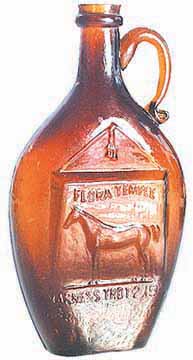
So This is Checkers?
(This article was rewritten on 09 February 2005 due to newly found information affecting its accuracy.)
Take a good look at the image below. It's an artist's conception of a serious checker game in a rural grocery store. Nice drawing, but the artist was clearly not a checker player.
However, the game these two are playing in fact could be one of two (or maybe even more, but we know of two) little-known checker variants, one of them quite old and the other quite modern. The game also looks a lot like (but isn't quite) several other unusual variants.
Do you know what variants would be an exact match? Can you name a few also-rans that don't quite make it?
Click on the picture to see a larger version; then come back and click on Read More for the solution.
[Read More]Position Beats Possession
The title of this problem is a saying of Tom Wiswell's, and when you find (or see) the solution, you'll understand the wisdom of it. The position arose in a handicap game that Mr. Wiswell played something like 50 years ago.
You might find this one a little difficult unless you're used to solving a certain type of problem (but if I told you what type I might be giving away too much). Good luck! When you've solved it, click here for an animated solution.
Carol Joy Cole: A Friend to the Checkers World
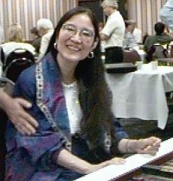
These have been fine items, though the "swirly" checkers are not strictly regulation, and the Danish checkers are a bit on the thin side. Now, Carol has improved her offerings by obtaining Roger Blaine's special order stock of genuine solid color Crisloid red and whites, in both 1.25 and 1.50 inch diameter sizes.
I splurged on both of these sets, and they are wonderful. The color and manufacture is uniform and the "feel" of the pieces is great. These are true regulation checkers, and an excellent value at $20 for the small and $30 for the large, plus $4 for shipping. Get them while they last!
You can reach Carol through her web site, as linked above, or by email at cjc@tir.com.
Checker Hall of Fame to Close as Walker Resigns Positions

On January 11, Mississippi newspapers published this article about Walker's January 7 arrest and indictment on Federal money laundering charges. The charges are tied to a series of companies operated by Walker, including the International Checkers Hall of Fame.
Prominent checker personalities and officials have been quick to point out the outstanding contributions made over a period of decades by Mr. Walker to the game of checkers. He has been a tireless promoter and organizer and has worked hard on behalf of the checker-playing community.
The charges against Mr. Walker are serious indeed. But let's not forget that in America, a man is innocent until proven guilty. Mr. Walker deserves fair consideration and a fair trial. And no matter the outcome, his record of service to the checker world will always stand.
February 1, 2005 update: additional news stories can be found here.
Coffee and Cake

"This problem has been dubbed by experts the champion 'coffee and cake' problem. This means that you can set this problem up for your friends and bet them coffee and cake that they cannot win it."
I bet Brian Hinkle coffee and cake, and not surprisingly, I now owe him! But can you win it? Give it a good try and then treat yourself to coffee and cake no matter the outcome.
You can view an animated solution here. Did you win coffee and cake?
The Checker Maven is produced at editorial offices in Honolulu, Hawai`i, as a completely non-commercial public service from which no profit is obtained or sought. Original material is Copyright © 2004-2024 Avi Gobbler Publishing. Other material is the property of the respective owners. Information presented on this site is offered as-is, at no cost, and bears no express or implied warranty as to accuracy or usability. You agree that you use such information entirely at your own risk. No liabilities of any kind under any legal theory whatsoever are accepted. The Checker Maven is dedicated to the memory of Mr. Bob Newell, Sr.
